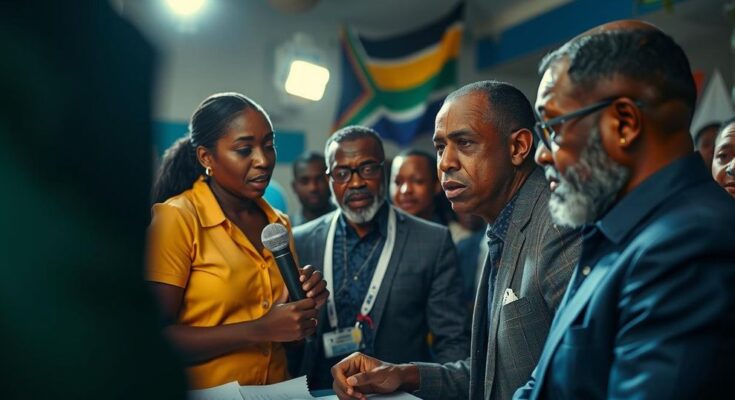Mauritius is poised for its 12th national election amid serious wiretapping allegations against government officials. The scandal has resulted in heightened tensions and led to a controversial social media ban intended to protect national security. Key issues at stake include high living costs, crime, and government transparency, with major candidates contesting for the trust of approximately one million voters.
Mauritius, a stable democracy, is conducting its 12th national election amidst serious allegations of wiretapping involving government officials. Approximately one million eligible voters are set to cast their votes, a process historically characterized by high participation rates nearing 80 percent. The investigations, instigated by leaked recordings, have prompted widespread public agitation and culminated in an unprecedented social media ban, which the government implemented to “preserve national security.” Opposition leaders and citizens expressed outrage at the government’s attempts to quell dissent and minimize potential embarrassment before the elections. The wiretapping scandal centers around recordings released by a TikTok account, purportedly showcasing conversations among high-ranking officials discussing opposition members and other civic figures. This has sparked allegations against Prime Minister Pravind Kumar Jugnauth and intensified scrutiny regarding civil rights and government transparency. Voting on Sunday will determine the composition of the National Assembly, where 62 out of 70 lawmakers are directly elected. The outcome will shape the future governance of a nation that has been recognized for its strong parliamentary democracy since gaining independence in 1968. Key candidates include Prime Minister Jugnauth, seeking re-election under the ruling Alliance Lepep; Navin Ramgoolam of the Labour Party, who has served multiple terms; and Nando Bodha of Linion Reform, aiming for a shake-up in the political establishment. These parties have distinct voter bases and strategies, with significant issues like the high cost of living, crime, and corruption taking center stage in their campaigns. The high living costs, particularly of fuel and essential goods, have been a major concern, leading to citizens demanding reforms to alleviate financial burdens. Moreover, security issues associated with drug use and increased crime rates have led to calls for effective measures from candidates, as well as demands for greater government accountability and transparency in light of widespread allegations of corruption. As the country prepares to vote, the ramifications of this election will not only impact governance but also the fundamental rights of Mauritians.
The political climate in Mauritius is currently on the precipice due to serious allegations of wiretapping involving high-ranking government officials. This situation arises just as the country prepares for national elections, where customary practices of fair play are overshadowed by emergent scandals. As Mauritius has maintained a robust democracy since its independence, the current allegations threaten to undermine the credibility of the political process. The diverse socio-economic makeup of the nation, alongside its historical political dynasties, adds a layer of complexity to the unfolding events, making the upcoming elections particularly significant for future governance.
In summary, the upcoming elections in Mauritius occur under the shadow of a wiretapping scandal that has significantly impacted public trust in government actions. Voters face critical choices regarding candidates who will address pressing issues such as living costs, security, and corruption. The election’s outcome will ultimately shape not only the political landscape of Mauritius but also the integrity of its democratic principles and civil liberties. Therefore, these elections represent a pivotal moment for the island nation as it grapples with its political future amidst ongoing turmoil.
Original Source: www.aljazeera.com




